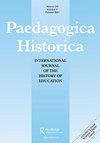澳大利亚男校中的种族男子气概:19世纪晚期澳大利亚的苏格兰和爱尔兰中学。
IF 0.3
4区 教育学
Q4 EDUCATION & EDUCATIONAL RESEARCH
引用次数: 4
摘要
本文章由计算机程序翻译,如有差异,请以英文原文为准。
Ethnic masculinities in Australian boys' schools: Scots and Irish secondary schools in late nineteenth-century Australia.
Recent research into the cultural construction of masculinity has shown it to be not a monolith, but multi‐faceted, contested, and changing over time. Masculinities are institutionalised and practised in many arenas of social life, but schools are especially important in endeavouring to shape and inculcate particular models and codes of masculinity. Historians of education in Britain and Australia have examined how Victorian boys' schools instilled an ideal of manliness, which changed markedly in the late nineteenth century. The English public school code of masculinity was a key feature of Australian boys' schools conducted by the Church of England and other English‐oriented churches and agencies. This article examines some schools established by Scots through the Presbyterian Church, and by the Catholic Church which was overwhelmingly Irish. The period from the 1880s to the First World War is focused upon, to ascertain what distinctive ideals or models ofmanhood may have been transplanted through these ethnic traditions, and the extent to which they differed from, resisted, or adapted to, the prestigious Arnoldian English code, supported as it was by the popular cultural ideal of British Imperial manhood. The question of whether a distinctively Australian model of masculinity was emerging at this time, and which ethnic traditions contributed most to it, is also explored.
求助全文
通过发布文献求助,成功后即可免费获取论文全文。
去求助
来源期刊

PAEDAGOGICA HISTORICA
Multiple-
CiteScore
0.90
自引率
40.00%
发文量
72
期刊介绍:
"Paedagogica Historica is undoubtedly the leading journal in the field. In contrast to a series of national journals for the history of education, Paedagogica Historica is the most international one." A trilingual journal with European roots, Paedagogica Historica discusses global education issues from an historical perspective. Topics include: •Childhood and Youth •Comparative and International Education •Cultural and social policy •Curriculum •Education reform •Historiography •Schooling •Teachers •Textbooks •Theory and Methodology •The urban and rural school environment •Women and gender issues in Education
 求助内容:
求助内容: 应助结果提醒方式:
应助结果提醒方式:


